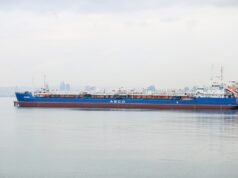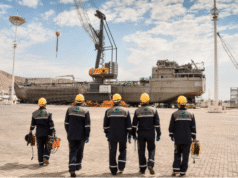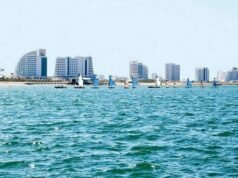Turkmenistan’s capital Ashgabat hosted an international conference, titled “Peace, stability and international cooperation in the Caspian region”, on October 18.
The event was attended by the authorized representatives of Azerbaijan, Iran, Kazakhstan and Russia.
Delegations outlined the positions of their states on the issues facing the Caspian states, related to their economic and environmental activities, possible ways of solving these problems, the establishment of scientific marine centers and the development of a national marine strategy, the Turkmen Foreign Ministry said in a message.
Most provisions of the future convention on the status of the Caspian Sea have already been agreed upon, the special envoy of the president on delimitation and demarcation of the border with neighboring CIS member states Igor Bratchikov said, RIA Novosti reported.
“It is well known that ‘only an insurance policy gives a full guarantee’. But seriously speaking, there are all chances and all conditions for a successful outcome of the negotiation process on the status of the Caspian next year,” he said.
The issue of determining the legal status of the Caspian Sea became relevant after the collapse of the USSR, when the emergence of new subjects of international law – Azerbaijan, Kazakhstan and Turkmenistan – raised the issue of delimitation of the Caspian Sea between the five countries.
The difficulties in determining the status of the Caspian Sea are linked, in particular, with the recognition of it as a lake or sea, the delineation of which is regulated by different provisions of international law.
“All parties are aware that the Convention will be a compromise legal instrument that should provide clear and transparent rules for our interaction in various fields, resolve possible disputes, become a reliable basis for preserving a safe and predictable situation in the region, preserving the Caspian Sea as a sea of friendship and good neighborliness,” the diplomat, who heads the Russian delegation at the talks on the Caspian, said.
In June 2017, a meeting of the special working group on the development of the Convention on the Legal Status of the Caspian Sea at the level of deputy foreign ministers of the Caspian states was held.
During the meeting, delegations discussed the remaining provisions of the draft Convention that had not been agreed upon. As a result of the negotiations, a number of provisions of the draft Convention were agreed upon. The delegations positively assessed the outcome of the talks.
The Caspian Sea is surrounded by the five coastal countries of Azerbaijan, Iran, Kazakhstan, Russia and Turkmenistan. The Sea has a total surface area of 371,000 square kilometers, holding 78,200 cubic kilometers of water.
The legal status of the Caspian Sea has remained unsolved during the past two decades, preventing development and exploitation of its disputable oil and gas fields and creating obstacles to the realization of major projects.
Russia, Kazakhstan, and Azerbaijan hold to the principle of dividing into national sectors based on the “median line” principles since it is an international boundary lake, and leaving the sea surface for general use, i.e. they are for demarcation of mineral resources and the Caspian Sea shelf, but against dividing up its waters.
Iran seeks an equal division of the Caspian into 5 even sectors, mainly because most of the offshore energy resources are located away from the Iranian coastline. Turkmenistan also demands the division of the Sea into equal parts between the pre-Caspian countries so that each country has 20 percent of the sea.
The Caspian littoral states signed a Framework Convention for the Protection of the Marine Environment of the Caspian Sea in November 2003.
© Content from this site must be hyperlinked when used






